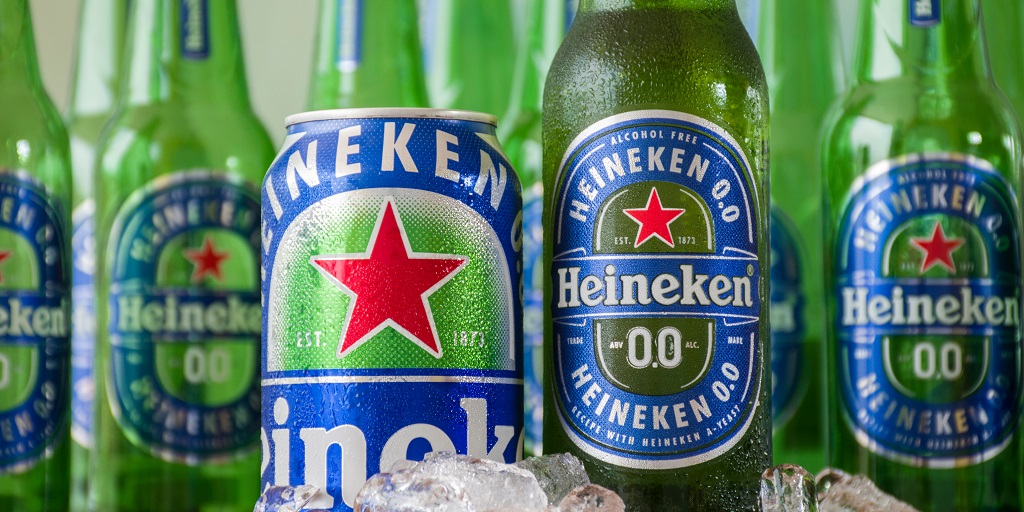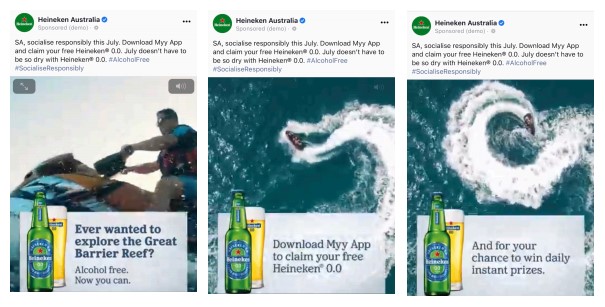
No-alcohol marketing test for Heineken 0.0

Heineken’s zero alcohol offering has faced an ABAC complaint, highlighting the potential perils of marketing no-alcohol beer brands.
A complainant criticised an Instagram advert for Heineken 0.0 which included a video of a person jetskiing.
They objected to the advertisement “because you can’t just advertise alcohol or zero alcohol beer with serious water activities”, saying that they had a family member die in Sydney Harbour in 1995 due to alcohol.
“[The alcohol advert] deeply offended us that alcohol companies are doing this trying to say its [sic] ok to just drink grog while navigating a major vessel,” they said.
Part of the ABAC regulatory code rules that marketing must not show or suggest the consumption of alcohol before or during any activity that requires a high degree of alertness or physical coordination, or which boating and swimming are examples.
Lion acknowledged that the zero-alcohol version is an extension of the Heineken masterbrand and said it accepted that the brand must meet certain ABAC restrictions relating to responsible consumption of alcohol and not having a strong or evident appeal to minors.
However, the brewer argued that it would be unreasonable to suggest it breaches the parts of the code relating to activities requiring alertness and coordination for safety purposes, given that it is not an alcoholic beverage.
Lion said its campaign was positioning no-alcohol beer as a choice “for all traditionally ‘non-beer’ moments”. It said the category is growing rapidly – with double digit growth for Heineken 0.0 last year – and there has been significant media coverage of the trend, implying consumers are aware of alcohol-free options from beer brands.
The ABAC adjudicating panel also highlighted the increase in popularity of non-alcoholic beers and admitted it had received public complaints to consider it in a marketing context.
ABAC’s adjudicators have been making determinations on Heineken 0.0 since its launch in Australia in 2018, as well as Carlton & United Breweries competitor line Carlton Zero.
The regulator admitted previously, as it has in this most recent ruling, that the application of ABAC standards to brand extensions has been “clunky” as the standards are designed for alcohol and “sit awkwardly” when applied to non-alcoholic beverages.
The panel said it applies a “common-sense and ‘spirit and intent’ approach” to the code in these cases, evolving from its ‘reasonable person’ benchmark.
“As the complainant has identified it is very important that alcohol marketing, including for zero alcohol brand extensions, does not encourage alcohol use before or during the operation of a jetski,” the ABAC panel commented.
The wider context of the ad promoted socialising responsibly, and highlighted the things you can do without alcohol, such as exploring the Great Barrier Reef, it said.
The core question the ABAC panel considered was whether a reasonable person would understand the Instagram post as suggesting that alcohol can be consumed in conjunction with “an inherently dangerous activity” like jetskiing.

Ultimately, the panel ruled that the premise of the ad is to reinforce that zero-alcohol beer is the only acceptable beer to consume when undertaking said activities, the product is clearly identified as zero alcohol throughout, and a reasonable person would not interpret it as encouraging alcohol consumption while operating a jetski.
While the panel dismissed the complaint and there are suggestions that the no-alcohol market may not necessarily be growing as fast as the hype around it, the marketing of no-alcohol versions of alcoholic beer brands remains a complex issue.
No-alcohol beer marketing
Whether zero-alcohol beer or other beverages should be considered as a replacement for alcoholic versions, or whether they should be considered in the soft drink category are issues the industry has been grappling with.
As seen in the Heineken 0.0 ruling and other precedents, ABAC considers non-alcoholic versions of drinks with alcohol branding as “brand extensions” and to a certain point, the code covers them.
While the major brewers have leveraged the masterbrands of their alcoholic beers into non-alcoholic versions, others, particularly in the craft beer space, have differentiated these brands.
Nort for instance, while it is tied to Modus Operandi, has its own website and does not prominently advertise this connection on its packaging, nor is it identified as a non-alcoholic version of any of MO’s core range, so it may not necessarily be considered a brand extension of Modus.
Other brands such as Heaps Normal, Sobah, and UpFlow have all launched as dedicated no-alcohol brands.
However, the perception both within the industry and externally has not been unified when it comes to use cases, and subsequently marketing.
In recent years, anti-alcohol lobbyists have critiqued the existence of non-alcoholic versions of alcohol brands. In 2019, the Foundation for Alcohol Research and Education said that the marketing of Carlton & United Breweries’ Carlton Zero was an effort to effectively “groom the next generation of drinkers”.
In 2019 FARE’s then-CEO Michael Thorn said marketing no-alcohol versions of their drinks was “deliberately deceptive” of alcohol companies.
“This beer product is virtually indistinguishable from full-strength beer, with the same logos, branding and packaging,” he said.
“This is a veiled push to market alcohol brands to kids. Alcohol is an addictive, carcinogenic drug and is the major contributor to teenage deaths through intentional injury, homicide and suicide.”
ABAC has previously ruled on Bundaberg Rum-flavoured Iced Coffee drinks and a Jim Beam BBQ Sauce which it considered brand extensions.
No-alcohol versions of alcoholic drinks, rather than food and beverage-related brand crossovers, have been treated a little differently, however ABAC has been relatively consistent when applying the code to these brands.
In response to a 2019 complaint about a radio advertisement for Carlton Dry, an ABAC panel said that while it is non-alcoholic, it is still an advert for beer and should be consistent with ABAC rules around broadcast demographics.
The panel reiterated its common-sense approach in that case, concluding that it would be “mildly perverse” to conclude that “an ad which seeks to promote a non-alcoholic beverage as an alternative to an alcoholic beverage was struck down for promoting the irresponsible use of alcohol”.
However, an ABAC panel has not yet had to make a ruling on a specific no-alcohol craft brand, or one not associated with an existing beer brand, so it remains to be seen what approach the regulator will take.



